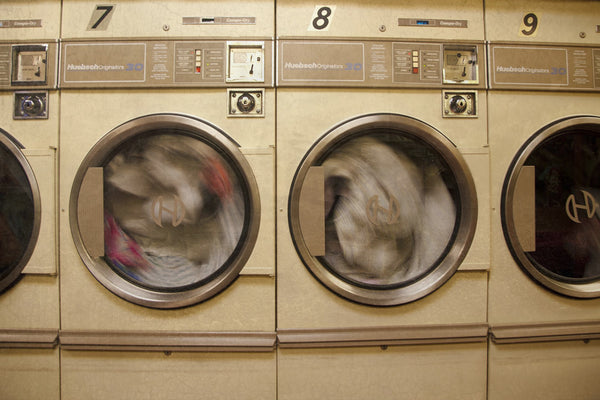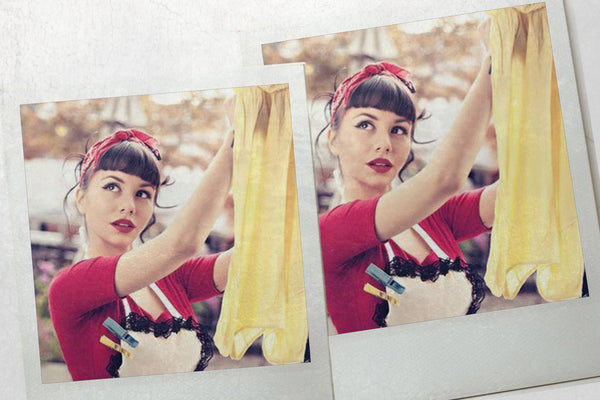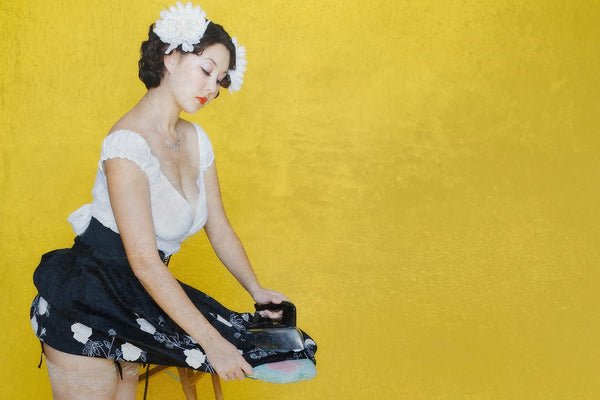
A T-Shirt, on average, lasts about two years. But with proper care and correct techniques, a shirt’s longevity can extend far beyond those years. After all, we all really want that favourite shirt to last as long as possible, don’t we?
1. The Basics

Check the tag/label inside the shirt
This will note the dos and don’ts, especially in regards to the washing and ironing of the shirt. The labels contain essential information for taking care of your shirt.
Be familiar with your shirt material
Shirts vary according to material and according to the material types, shirt care will vary, so it is essential to be familiar with the type of material your shirt is made out of for optimal care.
Take immediate action to stains
When a shirt is stained, it is ideal to soak it immediately in detergent. The fresher the stain, the faster it comes. Don't give it time to dry or it will set into the fibres of the material.
2. The Washing Process
Ensure the shirts are inside out
The inner part of shirts is in constant contact with the body and hence, absorbs dirt and sweat on the skin. Due to this, turning the shirt inside out would ensure that the areas that are needful of a proper wash receives such. Designs or prints on the shirt are also protected as they are turned inwards and don’t face direct washing exposure.
Separate the washing according to colour
Colours bleed easily, usually from dark coloured clothing into lighter coloured ones, especially the colour white. Therefore, white colours should always be washed separately. It is an added workload and takes up more time to separate the washing, but it essential to shirt care and longevity, and you will be thankful for the end result.
Detergent types
Chlorine based detergents cause discolouration so it best to avoid them. Detergents come in various levels of performance i.e. colour protection types, scented perfumed types, white clothing based types, and so forth. You can select the type you deem most appropriate, or if it’s too much of a hassle in investing in so many varieties, opt for a multi-purpose detergent.
3. Know Your Materials

Some materials are more sensitive and easily damaged than others. The majority of Twisted Thread -Shirts are cotton based but can have mixes of Polyester and Rayon.
So when washing, keep these tips in mind:
Cotton
Cotton is a durable textile and is the most commonly used material in t-shirts, so the washing tips mentioned above can all be applied as they are basic care. The most notable thing about cotton material is that they are prone to shrinking so cooler temperatures must be used when washing.
Polyester
Polyester is a strong and durable material that is usually used for clothing used under extreme, tough conditions. Polyester is resistant to most chemicals, stretching, abrasion and wrinkling so it is fairly easy to care for. But bear in mind that polyester is prone to stains. Should this be the case, use a steam remover on the fabric and allow it to sit 10-20 minutes before washing.
Rayon
Rayon is a textile that is made from cellulose produced by tress, making it a soft, smooth and absorbent material. Due to this, rayon is prone to colour bleeding and shrinking. As mentioned before, to prevent colour bleeding, separate the washing according to colours; and to prevent shrinkage, use cool water temperatures in the wash and refrain from ironing under high heat.
Wool
Wool is a slightly more complex material to look after due to its thickness and delicate fibres. Stains should be removed by blotting (do not rub!) with water or club soda. Wool clothing should be soaked in lukewarm and mild detergent for about 3-5 minutes before being rinsed out. Squeeze gently to get rid of any remaining moisture and lay flat to dry.
Try to refrain from constantly washing wool clothing. Instead, take precautionary measures such as using a lint roller or suede brush to remove dirt from clothing after every use.
These great tips for wool also apply to our Twisted Thread Hats which contain wool.
4. The Drying Process

Opt for the air dry option
This method is natural and doesn’t put stress or strain on the materials of your shirts. Either hang your shirts up on coat hangers, or invest in a clothesline or drying rack to put out your washing to air dry. Remember to avoid direct sunlight so colours don’t fade.
Avoid dry-cleaning, starching or tumble drying
These methods should best be avoided as they shorten shirt lifespans due to the stress and stretch they put on the material. High heat puts strain on most materials and cause them to become brittle and expand the fibres of the shirt easily. High chemical concentration also causes damage to materials, usually stiffening them up or causing stains or faded colours.
5. The Ironing Process (Optional)
Check label
Some articles of clothing are not suited for ironing, and this should be clearly stated on the label of the shirt. If the shirt can be ironed, there is usually additional instructions such as heat setting added into the label.
Use low temperatures
When ironing, it is best to avoid using high heat as it will put stress on the material and essentially, shorting the lifespan of your clothing. It is best to choose lower heat settings when ironing.
Use cotton cloth to cover shirt
To prevent imprints or mark from burning, it is advisable to place an additional layer of material over the shirt you are ironing. For this, it is best to use a cotton towel or handkerchief as cotton is a tough material.
6. Bonus Tips:

- For extra care we advise to use laundry bags to protect your Twisted gear.
- Use white wine to remove red wine stains (Tried and Tested!).
- Blot stained areas with detergent and soak for 3-5 minutes before washing.
- Use talcum powder to remove oil (or oil-based) stains.
- Spray vodka on smelly spots to remove bad odours.

Clothing only lasts as long as the amount of effort put into preserving and taking care of them. It does take more time and care to wash your own clothes with this added level of attention. Rest assured that the results are worthwhile.
Author: Jenn Tng





xCvgayRc
IThSAbeF
vJmquoHlxt
XEIUKoZdmLB
DoSJTEnOGZrLKH
VXvFJbkfM
ZoQtvfreNj
cbgSGTxARpKEkJj
PGAcOVkBfDIShEUQ
jBFNdgUOTRPHyt